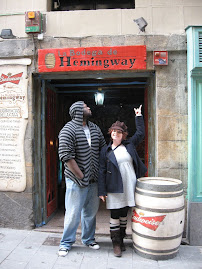I think, perhaps, why Burke might apply more appropriately to my dissertation is his discussion of "terministic screens" in Language as Symbolic Action. While Foucault's discussion on power relations in regard to disease and "madness" will be relevant to my discussions, Burke's "terministic screens" apply specifically--as David Blakesley as shown (and Dr. K would agree since he's also published in Blakesley's book)--to media and the ways in which media reflects and reinforces "reality."
Burke notes a distinction between "scientistic" and "dramatistic" approaches to language (44). "A 'scientistic' approach begins with questions of naming, or definition" (44). "Or, the power of language to define and describe may be viewed as derivative; and its essential function may be treated as attitudinal or hortatory: attitudinal as with expressions of complaint, fear, gratitude, and such; hortatory as with commands or requests, or, in general, an instrument developed through its use in the social processes of cooperation and competition" (44).
"dramatistic"--"stressing language as an aspect of 'action,' that is, as 'symbolic action'" (44).
"the 'scientistic' and the 'dramatistic' (language as definition, and language as act) are by not means mutually exclusive" (44).
"Definition itself is a symbolic act" (44). dramatistic view of language as "symbolic action" (45)
"Even if any given terminology is a reflection of reality, by its very nature as a terminology it must be a selection of reality; and to this extent it must function also as a deflection of reality" (45).
"'terministic screens' direct the attention" (45)
"Not only does the nature of our terms affect the nature of our observations, in the sense that the terms direct the attention to one field rather than another. Also, many of the 'observations' are but implications of the particular terminology in terms of which the observations are made. In brief, much that we take as observations about 'reality' may be but the spinning out of possibilities implicit in our particular choice of terms" (46).
"As Jeremy Bentham aptly pointed out, all terms for mental states, sociopolitical relationships, and the like are necessarily 'fictions,' in the sense that we must express such concepts by the use of terms borrowed from the realm of the physical" (46).
"'Reality' could not exist for us, were it not for our profound and inveterate involvement in symbol systems" (48).
"even something so 'objectively there' as behavior must be observed through one or another kind of terministic screen, that directions the attention in keeping with its nature" (49).
"Basically, there are two kinds of terms: terms that put things together, and terms that take things apart" (49).
"terministic screens positing differences of degree and those based on differences of kind" (50).
"We must use terministic screens, since we can't say anything without the use of terms; whatever terms we use, they necessarily constitute a corresponding kind of screen; and any such screen necessarily directs the attention to one field rather than another" (50).
"All terminologies must implicitly or explicitly embody choices between the principle of continuity and the principle of discontinuity" (50).
"It should be apparent how either situation sets up the conditions for its particular kind of scapegoat, as a device that unifies all those who share the same enemy" (51).
"all members of our species conceive of reality somewhat roundabout, through various media of symbolism. Any such medium will be, as you prefer, either a way of 'dividing' us from the 'immediate' [...]; or it can be viewed as a paradoxical way of 'uniting' us with things on a 'higher level of awareness'" (52).
"But are we not here 'necessarily' caught in our own net? Must we concede that a screen built on this basis is just one more screen; and that it can at best be permitted to take its place along with all the others?"
"I need but point out that, whether or not we are just things in motion, we think of one another [...] as persons. And the difference between a thing and a person is that the one merely moves whereas the other acts." I think this quote is important for those with intellectual/cognitive disabilities that seem to merely move rather than act because the "symbolic" is missing from the act. Again, response to Terri Schiavo illustrates this point.
"The human animal, as we know it, emerges into personality by first mastering whatever tribal speech happens to be its particular symbolic environment" (53).
From a Grammar of Motives: "A technique of analysis of language and thought as basically modes of action rather than a means of conveying information" (54).
Wednesday, July 18, 2007
Subscribe to:
Post Comments (Atom)








No comments:
Post a Comment